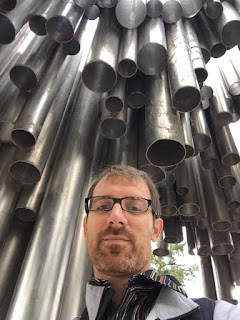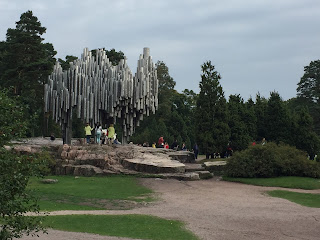134. Regional Travel #3.5 - Sibelius Monument & the Olympic Stadium
Jean Sibelius is without a doubt the most famous Finnish composer of "classical" music (specifically, he bridged the Romantic and Modern eras). He was active from the 1890s to the 1920s and is considered something of a hero in Finland. Several of his compositions helped foster a sense of national pride in the 1900s and 1910s, as Finland sought its independence from Russia (finally achieved in 1917). He was even featured on the 100 markka note until Finland's currency was replaced by the euro in 2002.
National Public Radio in the United States put together an excellent overview of his seven symphonies in 2015, complete with audio snippets and commentary. His well-known shorter compositions include Finlandia and the Karelia Suite. I don't think I've been to a live performance of his work before but have enjoyed exploring his oeuvre online since my return to Russia from my second visit to Helsinki.
The Sibelius Society installed the Sibelius Monument in a park on the west side of Helsinki in 1967, 10 years after the composer's death. It took me roughly 30 minutes to walk north to the park from downtown Helsinki. There were plenty of other tourists viewing the monument while I was there and it seems that this is a regular stop for tourist buses. Although reviews of the sculpture were mixed at the time it was designed, I enjoyed the monument and its setting at the edge of a bay leading into the Gulf of Finland.
A 15 minute walk east from the Sibelius Monument took me to the site of the Olympic Stadium. Helsinki hosted the 1952 Summer Olympics. It's a bit strange that such a small city hosted an Olympic Games, and that Finland would host the summer rather than winter edition. The Olympic Stadium is still standing - and in use - more than 60 years later. At the moment, however, it's being renovated and is closed to visitors until at least 2019, so I could only get as close as the construction barricades. The most notable feature is the tower, which is 238.5 feet tall and the same measurement as the length of the gold-medal javelin throw by Matti Järvinen in the 1932 Summer Olympics. A statue of Paavo Nurmi - another prominent Finnish athlete from the early 20th century - is in front of the Stadium. Nurmi set 22 world records and won 12 Olympic medals in middle-distance and long-distance running events.
National Public Radio in the United States put together an excellent overview of his seven symphonies in 2015, complete with audio snippets and commentary. His well-known shorter compositions include Finlandia and the Karelia Suite. I don't think I've been to a live performance of his work before but have enjoyed exploring his oeuvre online since my return to Russia from my second visit to Helsinki.
The Sibelius Society installed the Sibelius Monument in a park on the west side of Helsinki in 1967, 10 years after the composer's death. It took me roughly 30 minutes to walk north to the park from downtown Helsinki. There were plenty of other tourists viewing the monument while I was there and it seems that this is a regular stop for tourist buses. Although reviews of the sculpture were mixed at the time it was designed, I enjoyed the monument and its setting at the edge of a bay leading into the Gulf of Finland.
A 15 minute walk east from the Sibelius Monument took me to the site of the Olympic Stadium. Helsinki hosted the 1952 Summer Olympics. It's a bit strange that such a small city hosted an Olympic Games, and that Finland would host the summer rather than winter edition. The Olympic Stadium is still standing - and in use - more than 60 years later. At the moment, however, it's being renovated and is closed to visitors until at least 2019, so I could only get as close as the construction barricades. The most notable feature is the tower, which is 238.5 feet tall and the same measurement as the length of the gold-medal javelin throw by Matti Järvinen in the 1932 Summer Olympics. A statue of Paavo Nurmi - another prominent Finnish athlete from the early 20th century - is in front of the Stadium. Nurmi set 22 world records and won 12 Olympic medals in middle-distance and long-distance running events.




















Comments
Post a Comment